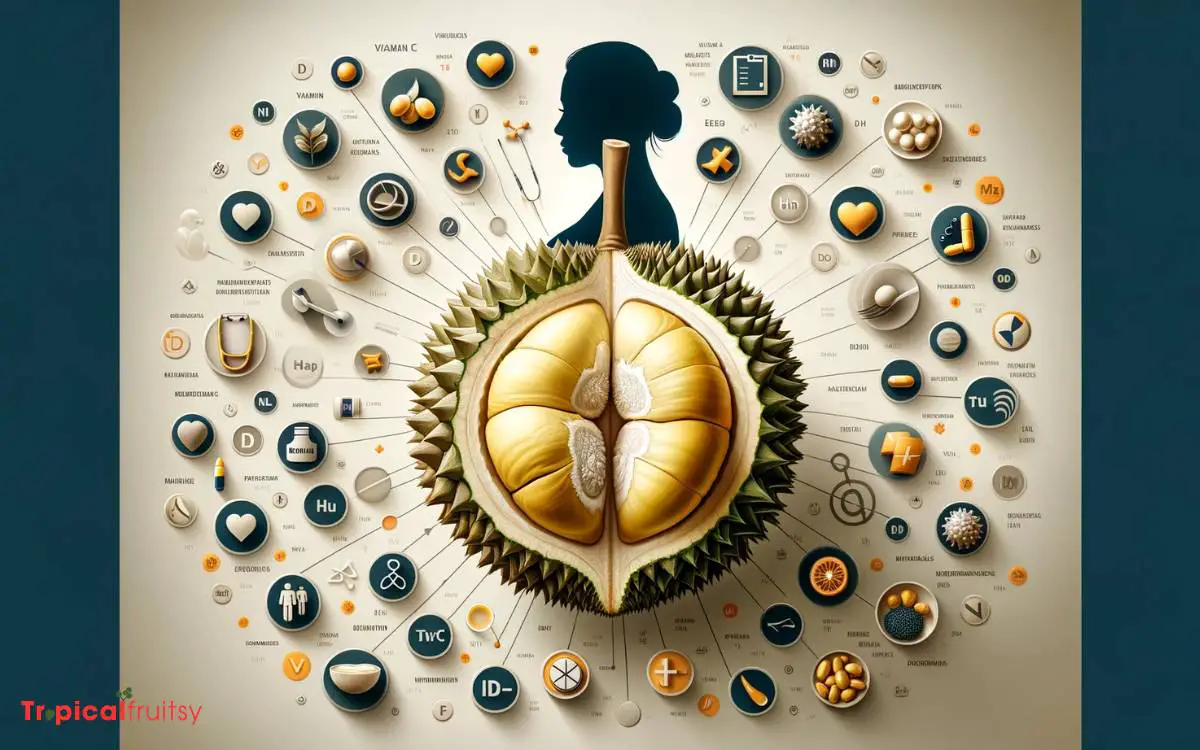Can Pregnant Women Eat Durian? Explained!
Pregnant women can eat durian, but it should be in moderation due to its high glycemic index and calorie content.
While it provides essential vitamins and minerals that could benefit the mother and the baby, it’s crucial to consult healthcare providers to ensure it fits within a balanced pregnancy diet.
The consumption of durian fruit during pregnancy has both potential benefits and risks. Durian is energy-dense and rich in nutrients such as Vitamin C, potassium, and dietary fiber, which may be advantageous for pregnant women.
However, due to its high sugar content and glycemic index, overconsumption might lead to excessive weight gain and blood sugar fluctuations.
Cultural beliefs also play a role in determining whether durian is appropriate for pregnant women, with some cultures advocating its consumption and others cautioning against it.
Durian’s nutrient-rich profile can be a tasty addition to a pregnancy diet when eaten in moderation and with medical guidance.

Key Takeaway
It is important to consult healthcare providers and practice safe consumption practices.
Considerations for Durian Consumption During Pregnancy
| Consideration | Recommendation |
|---|---|
| Durian Consumption | Safe for most pregnant women in moderation |
| Nutritional Benefits | Provides essential nutrients, like vitamin C and potassium |
| Moderation | Consume in small quantities, avoiding excessive intake |
| Allergies | Be cautious if you have allergies to durian |
| Individual Tolerance | Tolerance may vary; monitor how your body responds |
| Consultation | Always consult with a healthcare professional before making dietary changes during pregnancy |
Durian Nutritional Breakdown

Durian fruit’s nutritional profile includes a high caloric content with significant levels of carbohydrates, dietary fiber, and essential vitamins and minerals.
Specifically, durian provides a substantial amount of vitamin C, which is imperative for collagen synthesis and immune function.
It is also rich in B vitamins, particularly thiamin, riboflavin, and niacin, which are crucial for energy metabolism and neurological health.
Minerals such as potassium, present in durian, play an essential role in maintaining fluid balance and supporting cardiovascular health. The fruit’s high dietary fiber content aids in digestion and may contribute to a feeling of satiety.
However, due to its high caloric density, moderation is advised when consuming durian, especially for individuals monitoring their caloric intake.
Benefits of Durian in Pregnancy

During pregnancy, consuming durian can offer nutritional advantages, such as providing a rich source of vitamins and minerals that support both maternal health and fetal development.
The benefits include:
Rich in Dietary Fiber:
- Promotes Digestive Health: Helps prevent constipation, a common concern during pregnancy.
- Regulates Blood Sugar Levels: Potentially beneficial for managing gestational diabetes.
High in Vitamins and Minerals:
- Folic Acid: Crucial for preventing neural tube defects in the fetus.
- Potassium: Aids in maintaining optimal blood pressure levels, which is essential for preventing conditions like pre-eclampsia.
Pregnant women should, however, moderate their intake due to durian’s high caloric content and consult healthcare providers to ensure it fits within their specific dietary needs.
Potential Risks for Pregnant Women

While durian offers certain nutritional benefits, excessive consumption may pose health risks to pregnant women, including elevated blood sugar and excessive weight gain.
Durian’s high glycemic index may lead to spikes in blood glucose levels, which can be particularly concerning for those with gestational diabetes, a condition characterized by high blood sugar during pregnancy.
Gestational diabetes can increase the risk of complications such as preterm birth and long-term metabolic issues in both mother and child.
Additionally, durian is calorie-dense, and overindulgence could contribute to excessive maternal weight gain, potentially leading to obesity, hypertension, and an increased likelihood of requiring cesarean delivery.
Pregnant women should therefore moderate durian intake and consult healthcare providers regarding appropriate consumption.
Medical Experts’ Stance on Durian

How do medical experts view the consumption of durian by pregnant women in light of potential health risks?
The general consensus among healthcare professionals is one of cautious permissibility, with emphasis on moderation.
They acknowledge the nutritional benefits durian offers, such as vitamins and minerals, but also warn against excessive intake due to the fruit’s high caloric and sugar content.
Medical experts advise:
- Monitoring portion sizes
- To prevent excessive weight gain
- To control blood sugar levels
- Being aware of individual health conditions
- Such as gestational diabetes or cholesterol issues
This evidence-based approach ensures that pregnant women receive balanced information. Understanding the nutritional profile and potential risks can guide expectant mothers towards making informed choices.
Safe Consumption Practices

Adopting safe consumption practices, pregnant women can enjoy durian in moderation, ensuring both the health of the mother and the developing fetus.
To mitigate potential risks, women should prioritize consuming fresh durian from reputable sources, minimizing exposure to contaminants.
It’s advisable to limit intake to small servings, as durian is calorically dense and may contribute to excessive gestational weight gain if consumed in large quantities.
Additionally, since durian is rich in simple sugars, overconsumption could predispose to gestational diabetes, a condition warranting careful monitoring.
Women with pre-existing diabetes or those who are at risk should consult healthcare providers before incorporating durian into their diet.
Cultural Beliefs and Myths

Beyond the realm of scientific evidence, various cultural beliefs and myths also shape perceptions about consuming durian during pregnancy.
These beliefs often stem from traditional practices and are perpetuated through generations, despite the lack of empirical research to substantiate them.
It is crucial to approach these cultural narratives with a critical perspective:
Heatiness
- Myth: Durian is believed to cause excessive internal heat, potentially harming the fetus.
- Fact: No clinical research confirms that durian increases internal body heat in a manner detrimental to pregnancy.
Nutritional Misconceptions
- Myth: Consuming durian might lead to gestational diabetes due to its high sugar content.
- Fact: While durian is sugary, moderation is key, and existing diabetes should be managed with medical guidance.
Alternatives to Durian for Pregnancy

Pregnant women seeking alternatives to durian can consider a variety of nutrient-dense fruits that offer similar health benefits without the associated concerns.
Fruits such as mangoes, avocados, and bananas are rich in vitamins and minerals essential for fetal development.
Mangoes provide a substantial amount of vitamin C and folate, which are crucial for preventing congenital disabilities and enhancing the immune system.
Avocados are an excellent source of healthy monounsaturated fats, fiber, and potassium, which aid in maintaining proper heart health and digestion.
Bananas contribute significant levels of potassium and vitamin B6, supporting the development of the central nervous system and reducing the risk of pregnancy-induced nausea.
These alternatives are not only safe but also bolster the nutritional profile of a pregnant woman’s diet.
When to Eat Durian Fruit to Get Pregnant

Eating durian fruit or any specific food at a particular time to increase your chances of getting pregnant is not supported by scientific evidence.
Getting pregnant depends on various factors such as timing, fertility, and overall health rather than the timing of consuming a specific fruit.
If you’re trying to conceive, it’s essential to focus on factors that are known to affect fertility and increase your chances of getting pregnant:
- Track your menstrual cycle: Understanding your menstrual cycle and identifying your ovulation period is crucial. This is typically the best time to try for pregnancy.
- Maintain a healthy lifestyle: Eating a balanced diet, staying physically active, managing stress, and getting enough sleep are essential for overall reproductive health.
- Avoid harmful substances: Smoking, excessive alcohol consumption, and recreational drug use can negatively impact fertility. Avoid these substances when trying to conceive.
- Consider prenatal vitamins: Taking prenatal vitamins with folic acid before conception can help reduce the risk of birth defects.
- Have regular sexual intercourse: Ensure you have regular, unprotected sexual intercourse during your fertile window (usually a few days before and during ovulation).
- Seek medical advice: If you have been trying to conceive for a while without success, consult a healthcare provider or a fertility specialist. They can assess your specific situation and provide guidance or treatments if necessary.
Remember that individual factors can vary, and getting pregnant may take time for some couples.
It’s essential to remain patient and consult with a healthcare professional if you have concerns or need assistance with your fertility journey.
Eating durian fruit at a specific time is not a proven method for increasing your chances of getting pregnant.
Conclusion
While durian contains nutrients beneficial for pregnancy, potential risks necessitate caution. Medical professionals generally advise moderation, mindful of durian’s high caloric content and potential for gestational diabetes.
Culturally ingrained beliefs also influence consumption patterns. Is it not prudent, then, to weigh cultural practices against scientific evidence to ensure maternal and fetal health?
Expectant mothers should consult healthcare providers to tailor dietary choices, including durian consumption, to their individual health profiles.






